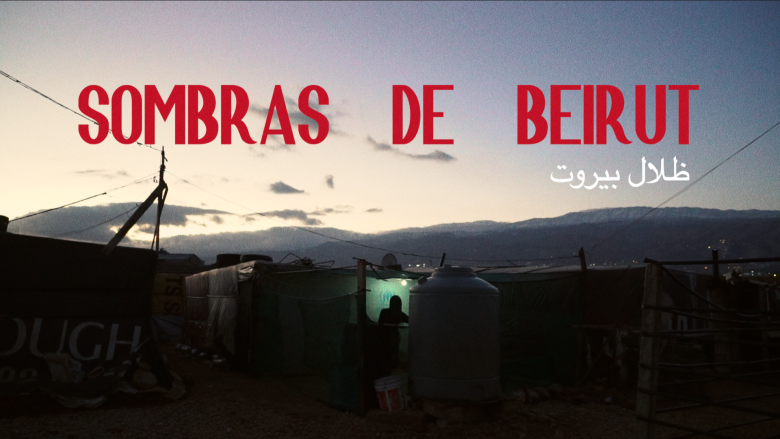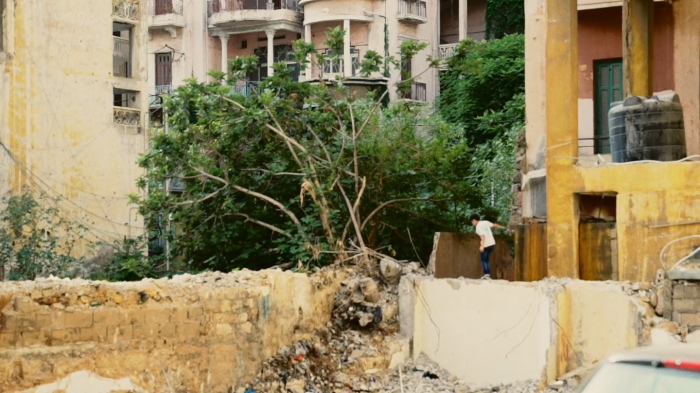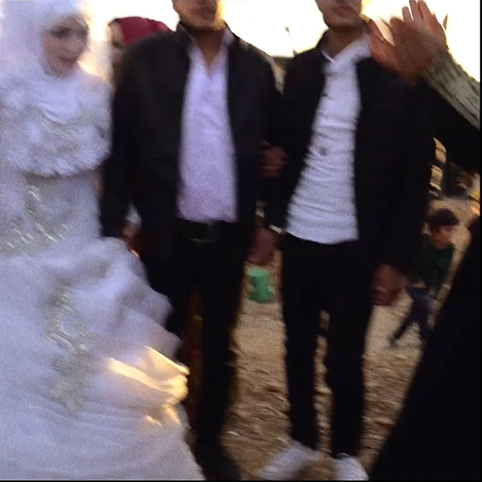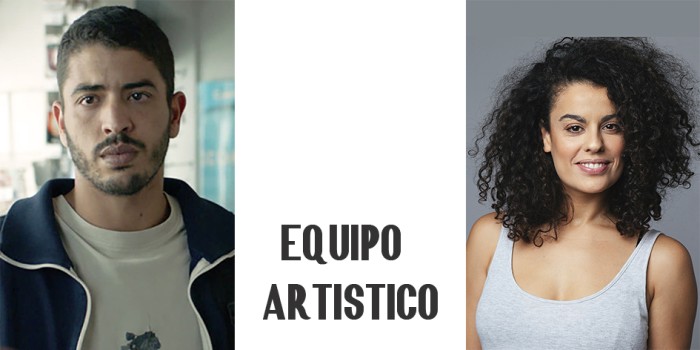Contributing € 10
Aley
- Thanks in our social media
- Thanks in our web site.
- Eternal gratitude.
> 06 Co-financiers
Goteo ha construido una historia única en el mundo del micromecenazgo. ¿Quieres seguir formando parte de ella?
Sombras de Beirut - Cortometraje


 Min.
Min.
 Opt.
Opt.

If you are a cultural or educational center:
If you are an individual person:
If you are a cultural or educational center:
If you are an individual person:
This short film mixes feature and reality to immerse us in the life of the Syrian refugees in Lebanon.
 Infrastructure
Infrastructure
|
Minimum | Optimum |
|---|---|---|
|
Travelling
Travelling expenses for two people for the shooting of the shortfilm in Lebanon.
|
€ 700 | |
|
Accomodation
Accomodation costs for two for the shooting in Lebanon.
|
€ 300 | |
|
Transactions - minimum
Transaction costs obtaining the minimum.
|
€ 275 | |
|
Allowance
Meal costs for two for the shooting in Lebanon.
|
€ 300 | |
|
Transaction - maximum
Transaction costs obtaining the maximum
|
€ 365 |
 Task
Task
|
Minimum | Optimum |
|---|---|---|
|
Edition and color
Edition and color of the footage to get the final cut of Sombras de Beirut.
|
€ 2.000 | |
|
Sound
Sound technician and equipment for the shooting.
|
€ 750 | |
|
Sound postproduction.
Sound mastering and postproduction for the final version of Sombras de Beirut.
|
€ 500 | |
|
Cast
Fiction scenes are performed Laulad (as Hassan) and Nagore (as Nadine).
|
€ 400 | |
|
Social Media
Campaign creation and management of the social media for the project.
|
€ 600 | |
|
Screenplay
Screenplay writing costs.
|
€ 1.000 | |
|
Camerawoman
Camerawoman and equipment for the shooting.
|
€ 1.000 | |
|
Translation
Support in Arab-English translation.
|
€ 1.000 | |
|
Promotion videos
Costs of teaser and different video pills and photos for social media.
|
€ 800 | |
|
Archive
Costs for historic images purchase.
|
€ 500 | |
|
Rewards - Maximum
Costs of the crowdfunding campaign rewards: photo printing, dinner, submissions... reaching the maximum.
|
€ 350 |
 Material
Material
|
Minimum | Optimum |
|---|---|---|
|
Rewards - minimum
Costs of the crowdfunding campaign rewards: photo printing, dinner, submissions... reaching the minimum.
|
€ 300 | |
| Total | € 4.925 | € 11.140 |
SYNOPSIS
How can be managed the country with the highest rate of refugees per capita of the world? That's the question the director and the scriptwriter made herself when she arrived to Lebanon. And that's the question that the short film tries to answer. Six million of Lebanese plus two million more of "refugees". The country haven't signed the Geneva Convention relating to the status of refugees, so they are legally considered as displaced people. There are no official refugee camps, there are informal camps paid by their pockets. They are only allowed to work in construction, cleaning and agriculture sectors.
Why are they treated this way? As well as trying to keep the fragil sectarian balance, we have to remember that Syrian occupied Lebanon from the 70s till 2005, saying that they were helping during the civil war. The checkpoints were stablished by the Syrian army. Nowadays is the other way around, the Lebanese army stops Syrian in the checkpoings.
To compile the information about the current situation, the are interviews with refugees, researchers, NGO and institution workers and people from the Lebanese army. These people are going to help us to anylize the stiuation the Syrian refugees are living, before and after the explosion, which impact has affected the whole community.
Two feature characters come with us in this story. Nadine is a young Lebanese woman who had to left her country when she was 8 years old, scaping the war and comes back after 20 years in Europe, and Hassan, a Syrian refugee who has been 3 years in Lebanon and has issues with his paperwork. These two characters share the violence experience and its reply. Why do we reply the violence? When does the spiral end?
TECHNICAL DETAILS
Duration: 25 minutes.
Format: HD
Director: María Aizpuru
WHERE ARE WE?
The trip to Lebanon was an initiatory trip. The idea emerges there and in that moment a few interviews were recorded. We need to complete this campaign to be able to go back to Lebanon, shoot more interviews and the curren situation.
Preproduction
This step of the process includes the research, the script writing and the shooting preparation. We are here. The research is completed and script written. If everything goes right, we will start preparing the shooting from march-april of next year.
Production
The production includes the shooting. Although during the initiatory trip we were able to make some contacts and three interviews that can be seen in the teaser, we have planed some more interviews, the recording of images of the current situation, feature scenes shooting and the purchase of Lebanese civil war archive images.
Postproduction
The postproduction step consists in putting all the images together and giving them a structure to have the definitive meaining and the final version of the film. Also we work in the sound in this phase to be coherent and atractive. The visual style is related to the 80s movies and the music will wrap us in the feeling of the loop that the character are living. The teaser is a small example.
OBJECTIVES
This short film reflects about inherited and future violence. It takes the country of Lebanon and the situation of the refugees as a mirror but it can be extrapolated to anyone and anyplace in the world.
Sombras de Beirut has as its core to call victim and agressor roles and labels into question. It opens this question through the recent history of Lebanon. It is a refocusing of ourselves and our judgement.

We have all heard about the Syrian war, about refugees, about Beirut blast, but not many of us know that Lebanon before the explosion was hosting the highest percentage of refugees per capita in the world. The situation can be idealized: all were living together. But the reality is that the lack of freedom is present. All the discourse changes when you know that Syria occupied Lebanon for more than 30 years.
Violence is part of life. The history repeats in an endless loop. The short shows this repetition, analyze its perpetuation and its reasons. Have you ever feel stuck in the same problem? Or a problem that repeat once and again? That individual replication... and collective? How do you cross the loop?
Aspects
There are some elements interlacing in the work: archive images, phone audio, interviews, photos, music, ambient sound, traffic... all is mixed to make it atractive and folloing an 80s movie style, with its grain and its charm. This is the place where the images take us. Music also joins the loop feeling and the repitition. It transmits the anxiety and overwhelm of the Syrian people and its reduced life options in the actual Lebanon.
Invitation
The director presents a trip to try to understan the current situation of the Syrian and Lebanese community, but also the relation we maintain with violence, our responsability in its replication. It is an invitation to question ourselves with the distance that a foreing conflict gives. It is an invitation to look in the mirror, in small and big violences and realize our responsability in the process, in the role we play in the loop.

CREW
Maria Aizpuru works as scripwriter, director and camera operator. Ibrahim Ali helps her in this last task, having filmed the footage of the wedding. Maria has directed a short film about Berta Caceres, a well know Human Rights defender, killed in Honduras. This work was awarded in different film festivales. Furthermore, she has experience in directing promos and music videos. In the educational and social area, she completed her PhD about participatory video methodology and she is working as a professor in the Film and Video School.
Xabier Hernaiz is in charge of the edition and colour retouch of our project. His career has been mainly directed to advertisement working to agencies as Move, Nu comunicación and Ad hoc. Moreover, he has worked for Moriarti Produkzioak, Hupper, the Quincena Musical, Fran Faca, Maider Alzaga, Tocado OH, Alex Robe and photographers such as Herve Gautier and Iturralde Photo Studio.
Andrea Sáenz has worked in shooting of films such as Bajo la piel del lobo, 70 Bin Ladens or La trinchera infinita (Goya award 2019 for best sound) and series such as La línea invisible. She has worked as boom operator in different feature and documentary short films: Azür, Back Home, Fin, Synthome, El hacedor de muebles...
Estanis Elorza with his studio Doctor Master, has worked for clients such as the Spanish Public Television or San Sebastian Jazz Festival. He has completed the sound postproduction for 86 Fahrenheit directed by Alberto Hernández, Apaga la luz y verás by Axel O'Mill, La casa del enigma by Gorka Merchan or Lursaguak by Izibene Oñederra (Kimuak 2019).
Hussein Farran, from Beirut, with Zaki Al Hamwi have joined this trip compossing the soundtrack for the film: ambient music with oriental touches perfect for the experiment.
Rawan Annan has worked with refugees in Lebanon. She supports us with the research and translations. She has worked in different NGO in the field and coordinated a radio project for the BBC.
CAST
Nagore González (Nadine) has a wide background working in theatre, television and films. She has acted in films as Nora (Lara Izagirre, 2019), Ático B (Pablo Allende, 2017 Zinebi Networking Award), short films such as La vida real (Iban del Campo, 2014) or 2x1 and series such as Goenkale XXI or Qué vida más triste (2009).
Laulad Ahmed Saleh (Hassan) has a short but very intense career, being one of the main characters in the film Oreina (Koldo Almandoz, 2018) and has just finished the shooting of the serial Ondar Ahoak of the same director.
Estella Carpi, London University, has completed an etnographic research at Akkar Valley, a border region in north Lebanon. She shares her knowledge about the hosting process in receiving societies, the relations that are being stablished with the displaced people and the role of humanitarian organizations.
Jean Kassir is a researcher at Carneggie Middle East Center. He has participated in the article Unheard voices. What Syrian refugees need to return home, where the political attitudes of the Syrian refugees in Lebanon are analyzed. He helps us going deeper in the legal framework and the political context of the Syrian community.
Maha, Raeda, Mona, Farah, Asya are part of the same family. 23 people are living under the same roof. Most of them are widows, although there are still three men living in the house. Men are the only ones who could work, females can not. In Arab they are considered "little women". The exact translation can not be done, but the word is refering to the fact that they are not complete women.


Syria occupied Lebanon from the 70s until 2005. The experience is still present in the Lebanese society. Moreover, the government is not interested in giving them confortability and leting them stablish and nationalize. That's why Lebanon and its neighbouring countries haven't ratified the Geneva Convention relating to the status of refugees (1965).
This short film pretends to open reflections about the situation of the refugees, the strategy of this country and of Europe about these problems. Moreover, it tries to rise the awareness about our responsability of the position ourselves towards violence, how easy it replies when we suffer it and our individual responsability on it.
Aley
> 06 Co-financiers
Zahle
> 08 Co-financiers
Batroun
> 04 Co-financiers
Biblos
> 04 Co-financiers
Sour
> 01 Co-financiers
Baalbek
If you are a cultural or educational center:
If you are an individual person:
> 04 Co-financiers
Bekaa
If you are a cultural or educational center:
If you are an individual person:
> 00 Co-financiers
Saida
> 00 Co-financiers
Tripoli
> 00 Co-financiers
Beirut
> 00 Co-financiers
All Lebanon
> 00 Co-financiers
Translation to different languanges: - English/Basque - Spanish/Basque - Arabic/English/French ...